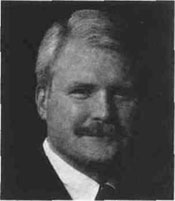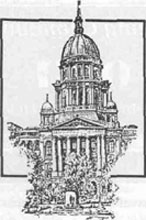Legal/Legislative Scene IAPD Pushes for Constitutional Amendment on Unfunded Mandates
by Peter M. Murphy
The IAPD is working in cooperation with the Illinois Municipal League and other groups representing local government to seek a constitutional amendment on unfunded state mandates. The bipartisan committee composed of members of both the Illinois House and Senate has been meeting to formulate language which would be acceptable to the leadership of the General Assembly. The amendment, if passed by May 6, 1996, would be placed on the ballot on November 5, 1996. This effort is designed to stem the tide of unfunded state mandates and will go a long way towards controlling unexpected costs at the local level. Following is a brief overview on some of the most commonly asked questions regarding mandates. Q. WHAT IS A MANDATE? A. "Mandate" is the shorthand term used by local officials for requirements imposed on their unit of government. A state mandate is one imposed by a state law or regulation. Federal mandates can apply to either states, local governments, or both. In many cases a federally imposed mandate is reimposed by the state and so is both a federal and state mandate on a unit of local government. Q. WHY ARE MANDATES A PROBLEM?
A. Individuals elected to run a park district, forest preserve, municipality, township, county, school or other unit of local
government come into office believing
they will have authority to make decisions
Increasingly, special interest groups seek legislation in Springfield to mandate that local government provide some special service or program. Although these mandates do not reflect a statewide need, often the General Assembly passes a new law or amends a regulation to accommodate that special interest. The end result is a mandate that diverts local taxes to implement a requirement that is not needed and not wanted. Local officials are then left with the choice to increase taxes to pay for the mandate or decrease local services and programs desired by their citizens.
A. You do. Local citizens and businesses pay for most state mandates through increased local taxes and fees. Most mandates are unfunded or underfunded. This means state government adopts the legislation and/or establishes regulatory requirements without providing any funds to implement and maintain the legislation or regulations. The costs for implementation and maintenance are borne by local taxes or fees. 11 • Illinois Parks & Recreation • January/February 1996 Legal/Legislative Scene Q. HOW MUCH DO STATE MANDATES REALLY COST? A. Exact figures are not available. A recent study of unfunded municipal mandates conducted by Governors State University, the Illinois Municipal League, and the City of Chicago documented more than $146 million in costs relating to state mandates by 67 participating communities. The survey showed that both large and small local governments are affected by the unfunded mandates problem. As a percentage of their budget, small local governments may be spending more on unfunded mandates than larger communities. In a 1992 study, the Illinois Department of Commerce and Community Affairs (DCCA) estimated that, since 1981: "... there are 237 Public Acts listed in the catalog, creating 68 Organization and Structure Mandates, 49 Due Process Mandates, 30 Service Mandates, 51 Tax Exemption Mandates and 128 Personnel Mandates. The total cost that could be estimated is $201,457,265, less State participation of $11,357,713, leaving at total cost to local government of $190,099,552." This report was unable to document a financial cost of substantial mandates such as mandated collective bargaining laws. Q. ARE LOCAL GOVERNMENTS OPPOSED TO MANDATES THAT PROTECT THE PUBLIC HEALTH, SAFETY AND WELFARE OF CITIZENS? A. No. Locally elected officials are committed to providing public services that enhance the health, safety, and welfare of their citizens. They support and continue to develop programs to advance these and other objectives. But local officials are opposed to unfunded, inflexible, "one-size-fits-all" laws and regulations. These laws and regulations impose unrealistic time schedules for compliance, specify the use of procedures or facilities when less costly alternatives might serve as well, and require far more than underlying laws appear to require. Local officials want to concentrate on performance, not procedure, and want the best benefit for the local tax dollar. Q. WHAT IS "MANDATES REFORM"? A. The term "Mandates Reform" is used by local governments to indicate an understanding that some mandates will always exist and some new mandates will be passed. Repeal of all mandates is not a goal. Mandates Reform means the state should meaningfully recognize the key partnership that exists between local governments and the state of Illinois. A new Unfunded Mandates Constitutional Amendment pertaining to local governments and school districts is being developed in a cooperative format with representatives of the four legislative caucuses. The Governors Office, Lieutenant Governor, Secretary of State, and Comptroller have all indicated general support for the attempt to develop a solution to the mandates problem in a cooperative manner with the General Assembly. Q. IS A CONSTITUTIONAL AMENDMENT ON UNFUNDED MANDATES REALLY NECESSARY? A. Yes. In 1992 the Illinois General Assembly presented a statewide advisory referendum on the November ballot asking Illinois voters: "Should the Illinois General Assembly, in order to stop increasing property taxes due to unfunded mandates on local government, approve a Resolution for a State Constitutional Amendment prohibiting the General Assembly and Governor from adopting new unfunded state mandates that impose additional costs on units of local governments?" In the 1992 November general election, more than 3,000,000 Illinois citizens (80.6% of the total number of voters casting ballots) voted "yes" on the advisory referendum calling for a State Constitutional Amendment prohibiting the General Assembly and the Governor from adopting new unfunded state mandates. Q. WHAT CAN LOCAL LEADERS DO ABOUT MANDATES? A. Local government leaders must speak out about the impact of state mandates on their local government, their budget, and on the pocketbooks of their citizens. They must also take responsibility for educating their constituents about the impact of state mandates on local priorities. Organizations representing state and local governments in Springfield are providing information and resources to help local leaders educate their constituents and their legislators about the impact of mandates and the urgent need to create a better way of doing business—a partnership where the state and local government work together to agree on priorities and methods of achieving those shared commitments. If your park district or forest preserve is facing a mandate that is increasing your cost of providing services to your community, please contact me at IAPD.
Illinois Parks & Recreation • January/February 1996 • 11 Legal/Legislative Scene Referenda Results The following are the results of referenda submitted to the votes for the Nonpartisan Election held November 7,1995. The data for this report was obtained from election authorities and jurisdictional canvassing board abstracts. Of the 290 referenda proposals, 162 passed and 128 failed. The following is a summary of those referenda.
Park District Referenda Results
12 • Illinois Parks & Recreation • January/February 1996 |
||||||||||||||||||||||||||||||||||||||||||||||||||||||||||||||||||||||||||||||||||||||||||||||||||||||||||||||||||||||||||||||||||||||||||||||||||||||||||||||||||||||


 that will reflect the will of their citizens
and to move the community according to
that will. Local officials are expected to
make decisions regarding higher spending for increased services or limiting services and reducing local taxes. In either
instance, a newly elected official soon realizes that decisions made in Springfield
or Washington too often divert local resources to fulfill mandated requirements.
The end result is the local official either
has to raise additional taxes or decrease
non-mandated locally desired services.
that will reflect the will of their citizens
and to move the community according to
that will. Local officials are expected to
make decisions regarding higher spending for increased services or limiting services and reducing local taxes. In either
instance, a newly elected official soon realizes that decisions made in Springfield
or Washington too often divert local resources to fulfill mandated requirements.
The end result is the local official either
has to raise additional taxes or decrease
non-mandated locally desired services.